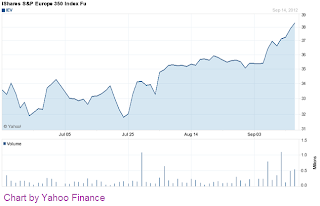The week ahead keys on three points, consumers, manufacturing and housing, just the way we like it. These three factors are playing such important roles in investor decision making these days that they’ll offer some good fodder for debate and discussion, and maybe volatility as well. Obviously, the data will continue to be drowned out by geopolitical chaos and global macroeconomic deterioration. Plus there’s that little yearly lambasting provided by
Iran
’s President at the United Nations in New York to look forward to, and the accompanying wars and rumors of wars to argue about. Last week, the SPDR S&P 500 ETF (NYSE: SPY) fell fractionally.
The Week Ahead
Monday
Manufacturing data is on tap to start the week with the reporting of the
Dallas Fed’s Manufacturing Survey at 10:00 AM EDT. Just last week, we heard from the New York Fed, Philly Fed and we received the Markit PMI Manufacturing Index Flash. Economists surveyed by Bloomberg see the Dallas Fed index improving to +0.5, from -1.6 in August.
|
Manufacturing Index
|
Reported
|
Expected
|
|
Empire State Index
|
-10.4
|
-2.0
|
|
Philly Fed Index
|
-1.9
|
-4.0
|
|
Markit PMI Index
|
51.5
|
51.5
|
Before the new manufacturing data reaches the wire though, we’ll get a look at the
Chicago Fed’s National Activity Index at 8:30 AM EDT. In July, the index improved but remained in tough territory at negative 13, versus minus 15 in June.
At 3:10 PM ET, look for a speech by
San Francisco Fed Bank President John Williams, after which he will take questions.
The day’s
corporate wire has annual shareholder meetings at General Mills (NYSE: GIS), FedEx (NYSE: FDX), Caterpillar (NYSE: CAT) and Flagstar Bancorp (NYSE: FBC). Look for earnings reports from Lennar (NYSE: LEN), Paychex (Nasdaq: PAYX), Red Hat (NYSE: RHT), pSividia (Nasdaq: PSVD) and Ennis (NYSE: EBF).
Tuesday
Last week offered a slew of housing data, and this week offers a good deal more relative news. At 9:00 AM ET Tuesday, the
S&P Case Shiller Home Price Index is expected to show another month of price increase, this time for July. Economists surveyed by Bloomberg see the 20-city composite rising 0.9% on a seasonally adjusted basis. That would follow June’s reported increase of the same. On a year-to-year basis, sales are expected to have grown by 1.2%, following June’s 0.5% increase.
At 10:00 AM, we’ll get the
House Price Index from the Federal Housing Finance Agency (FHFA). This index covers single family housing units based on Fannie Mae (OTC: FNMA.OB) and Freddie Mac (OTC: FMCC.OB) data. Economists see this index showing a 0.8% increase in home prices for July. It would follow June’s 0.7% rise.
Another regional manufacturing data point finds the wire Tuesday, with the
Richmond Fed’s Manufacturing Index scheduled for 10:00 AM release. Economists see this index continuing to portray a difficult environment, though to a lesser extent; the index is seen improving to negative 4 from negative 9 in August.
The Conference Board reports on
Consumer Confidence at 10:00 AM this Tuesday. Economists see this measure of the consumer mood improved from its dramatic 4.8 point drop in August. The consensus view is for improvement to 64.8 in September, up from 60.6. In its absolute state, the figure still reflects poor consumer conditions and trouble for the economy.
State Street (NYSE: STT) reports on
Investor Confidence at 10:00 AM. This measure looks at the risk taken by institutional investors. In August, the index fell to 90.0, from 94.0 in July. I would expect the measure to have improved substantially in September, as stocks gained globally on ECB chatter and Fed hopes.
We receive the two regular
chain store sales reports every Tuesday morning. Last week the report from the International Council of Shopping Centers (ICSC) showed a negative 2.5% decline in sales week-to-week. On a year-over-year basis, sales only edged up 2.1% for the period ending September 15, which is a negligible change given the rate of inflation. Redbook’s measure of year-to-year chain store sales change showed just a 2.4% increase.
The
equity schedule has ONEOK (NYSE: OKE) and LeMaitre Vascular (Nasdaq: LMAT) hosting investors and analysts. Cardium Therapeutics (NYSE: CXM) presents at the Noble Financial Markets Life Sciences Exposition. The earnings schedule highlights Carnival (NYSE: CCL), CalAmp (Nasdaq: CAMP), Copart (Nasdaq: CPRT), FactSet (NYSE: FDS), Jabil Circuit (NYSE: JBL), Lentuo International (NYSE: LAS), Neogen (Nasdaq: NEOG), OMNOVA Solutions (NYSE: OMN), Park City Group (Nasdaq: PCYG), SYNNEX (NYSE: SNX), Synthesis Energy Systems (Nasdaq: SYMX) and Vale Resorts (NYSE: MTN).
Wednesday
Even more housing news arrives Wednesday morning, when the
New Home Sales Report is released at 10:00 AM. Economists see the annual pace of new home sales improved in August to 380K, up from 372K reported for July.
The Mortgage Bankers Association (MBA) offers its latest on mortgage activity in the pre-market. Last week’s
Weekly Applications Survey indicated the Market Composite Index of mortgage activity edged lower by 0.2% for the week ending September 14. This was despite the record low mortgage rates reported for some types of loans.
The Energy Information Administration (EIA) offers up its latest
Petroleum Status Report at 10:30 AM. Oil prices are on the decline of late, with focus turning to soft demand on global economic weakness, and assurances of supply by some OPEC stalwarts. For the week ending September 14, U.S. commercial crude oil inventories increased by 8.5 million barrels. Stores were in the upper limit of the average range for this time of year. Total motor gasoline stocks decreased by 1.4 million barrels; inventory is in the lower half of the average range for this time of year.
The
corporate news schedule highlights Concho Resources (NYSE: CXO) and its presentation at the IPAA OGIS San Francisco. BNP Paribas (OTC: BNPQY) is presenting at the Bank of America / Merrill Lynch Banking & Insurance CEO Conference. The earnings slate has news from Landec (Nasdaq: LNDC), Progress Software (Nasdaq: PRGS), Texas Industries (NYSE: TXI) and Worthington Industries (NYSE: WOR).
Thursday
Durable Goods Orders are set for report at 8:30 AM. Economists surveyed by Bloomberg see orders falling 5.0% in August, after rising 4.2% in July. Excluding transportation, orders are seen edging up 0.2%, against a 0.4% decline in July. The timing of transportation orders played a big role in last month’s results as well.
Revised
GDP data for the second quarter is due for 8:30 reporting, but economists see the 1.7% growth quoted at last check sticking again Thursday. The GDP Price Index is likewise expected to hold at +1.6%.
Will this be the week? We have been warning that one fateful week,
initial jobless claims will breach 400K and impact equities in a meaningful manner. However, this time around economists see claims easing a bit to 376K, from 382K reported last week.
At 9:45 AM, the weekly
Bloomberg Consumer Comfort Index offers some complement to the Conference Board report of a couple days earlier. In the week ending September 20, the index gained 1.4 points to negative 40.8.
A busy day for data serves up yet another housing data point at 10:00 AM, when
Pending Home Sales is reported for the month of August. Economists see this forward looking measure marking a 0.3% increase, though that is a slower rate of gain than the 2.4% increase reported for July.
One more manufacturing data point finds the wire at 11:00 AM when the
Kansas City Fed produces its Manufacturing Index. Economists see the Midwest measure marking 5 in September, down from 8 in August.
The EIA reports on
Natural Gas Inventory at 10:30 AM. For the week ending September 14, natural gas inventory increased by 67 Bcf, leaving stores 278 Bcf above the five-year average for this time of year.
The
corporate wire has analysts days at Urban Outfitters (Nasdaq: URBN) and Advisory Board (Nasdaq: ABCO). Axcelis Technologies (Nasdaq: ACLS) is presenting to the Craig-Hallum Alpha Select Conference. Earnings reports highlight news from Nike (NYSE: NKE), Accenture (NYSE: ACN), McCormick & Co. (NYSE: MKC), Discover Financial (NYSE: DFS), Micron Technology (NYSE: MU) and Global Payments (NYSE: GPN). Also find reports from Actuant (NYSE: ATU), AZZ (NYSE: AZZ), IDT (NYSE: IDT), Radiant Logistics (Nasdaq: RLGT), S&W Seed (Nasdaq: SANW) and Sealy (NYSE: ZZ).
Friday
Three important reports cap off the week in a meaningful way. The most significant of the three, in my view, comes first with the reporting of
Personal Income & Outlays for the month of August. Real spending results offer better insight into consumers than the sentiment indexes which litter the week as well. Economists see personal spending up 0.5% in August, after a 0.4% increase in July. It would be good news if it holds true, but we need to account for price change as well.
The Fed’s favorite inflation gauge is also found in this report. The PCE Price Index is expected to have moved 0.5% higher in August, though on volatile food and energy action. The Core PCE Price Index is expected to have gained only by 0.1%, which compares against its unchanged status in July. Personal income is seen up 0.2%, against a 0.3% increase in July. Salaries and wages have less pressure against them than in recent years past, but caution is likely the current mantra of human resources representatives, given nascent economic sluggishness.
One last manufacturing data point finds the wire at 9:45 AM when the
Chicago Purchasing Managers Report comes due. Economists see this report for September holding the Business Barometer Index steady at 53.0.
Keeping with the theme, one more consumer sentiment release closes out the week. The
Reuters University of Michigan Consumer Sentiment Index is up at 9:55 AM. Economists are looking for a read of 79.0, versus the 79.2 marked at mid-month. That
last reading marked a significant improvement from the time before.
The last trading day of the month offers corporate presentations from Diversified Restaurant Holdings (OTC: DFRH), Gas Natural (Nasdaq: EGAS), Gibraltar Industries (Nasdaq: ROCK), MOD PAC (Nasdaq: MPAC) and Sucampo Pharmaceuticals (Nasdaq: SCMP). Look for earnings from Walgreen (NYSE: WAG), American Greetings (NYSE: AM), Finish Line (Nasdaq: FINL), SinoCoking Coal and Coke Chemical Industries (Nasdaq: SCOK), Tianyin Pharmaceutical (NYSE: TPI) and WSP Holdings (NYSE: WH).
Please see our disclosures at the Wall Street Greek website and author bio pages found there. This article and website in no way offers or represents financial or investment advice. Information is provided for entertainment purposes only.

Labels: Market-Outlook, Market-Outlook-2012-Q3, Week-Ahead
































